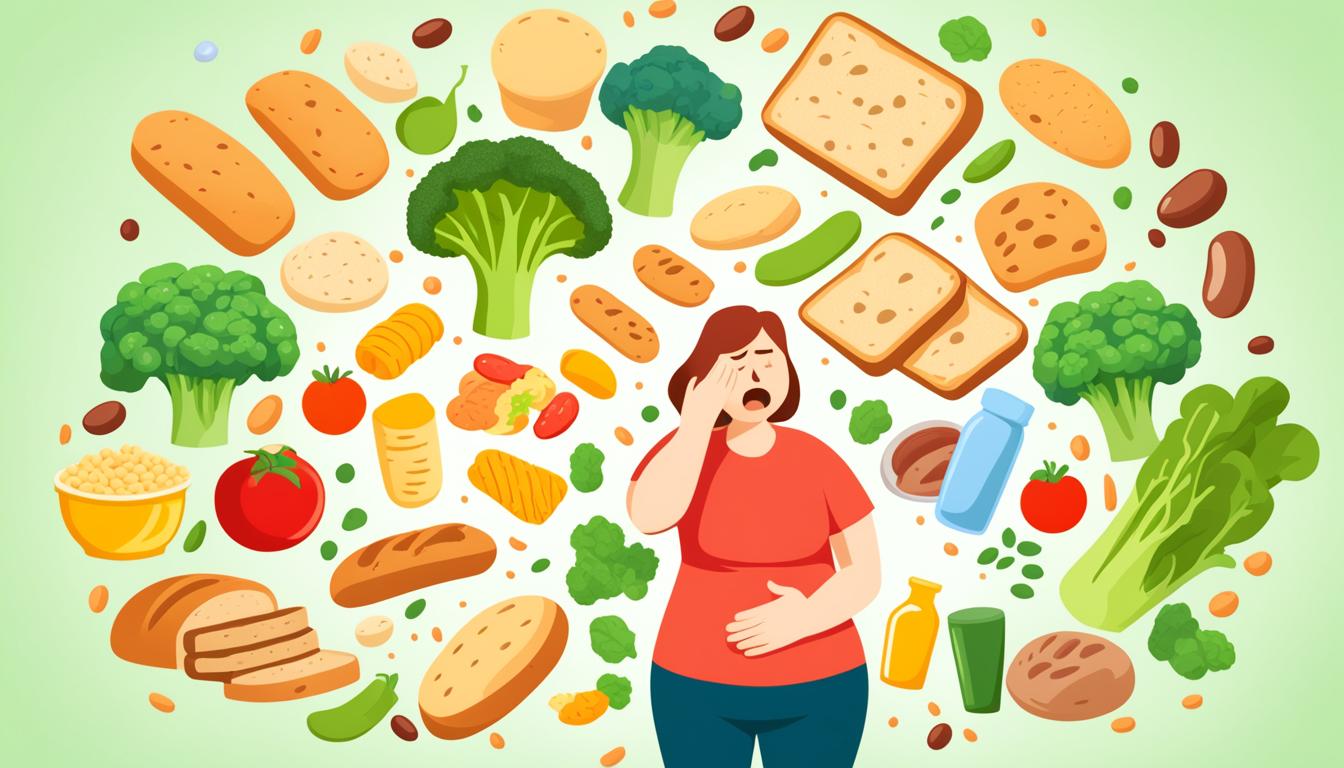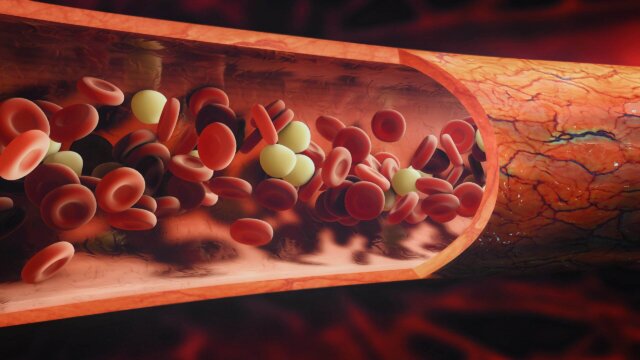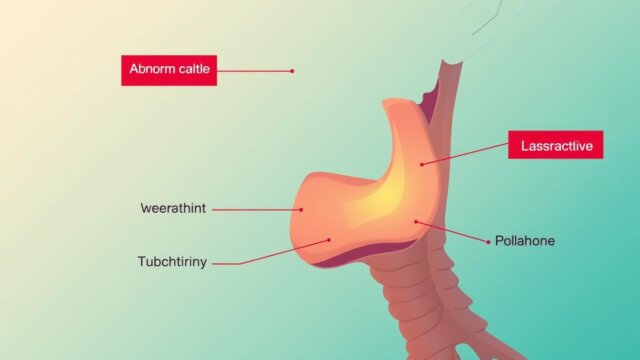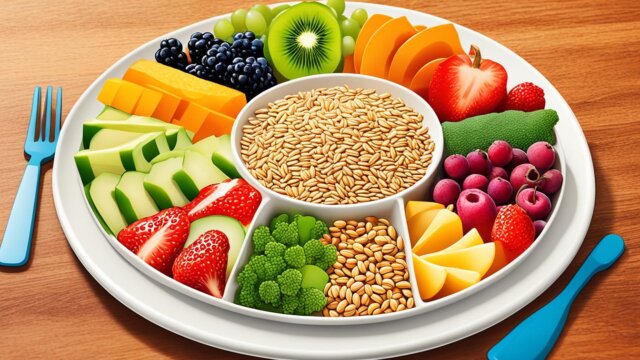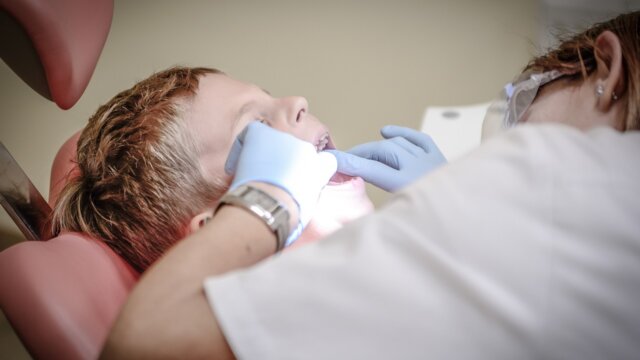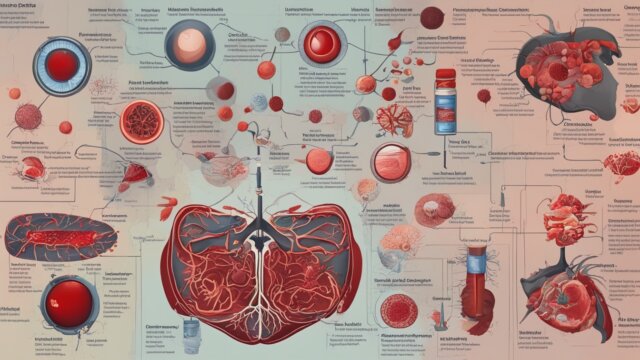FTC disclaimer: This post may contains affiliate links and we will be compensated if you click on a link and make a purchase.
Did you know that 10% to 30% of people often feel bloated? This issue can make you feel uncomfortable, gassy, and even sick. There are many reasons why people get bloated, like indigestion, food intolerances, hormonal changes, and chronic conditions. But don’t worry, you can find ways to feel better and stop it from happening again.
Key Takeaways
- Abdominal bloating is a common problem for both adults and kids.
- Gas is the top reason for bloating, often after eating.
- Eating too much, drinking alcohol, and stomach infections can cause bloating.
- Food intolerances, IBS, and other digestive issues can lead to ongoing bloating.
- If bloating is severe, it’s important to see a doctor.
What is Bloating?
Definition and Symptoms
Bloating is when you feel your belly is full, tight, or swollen. It can be mild or very painful. You might also feel your belly sticks out, have gas, or have trouble going to the bathroom. It could mean you have a gut issue or another health problem.
The signs of bloating include:
- Feeling like your stomach is swollen or “bloated”
- Pain in your stomach
- Too much gas and burping
- Hard time passing stool or constipation
Bloating can really affect how you live your life, making everyday tasks hard and lowering your happiness. Knowing what causes it and how to deal with it is key to a healthy gut and feeling better.
“Bloating can be a frustrating and debilitating experience, but with the right knowledge and strategies, it can be managed effectively.”
Common Causes of Bloating
Bloating can be a frustrating and uncomfortable experience. Many people face this issue. It comes from gas buildup or food intolerances. Knowing what causes it is key to finding relief.
Gas and Digestive Issues
Gas in the stomach and intestines is a big cause of bloating. Half of the gas comes from swallowed air, and the rest from gut bacteria. Drinking carbonated drinks, chewing gum, and eating fast can increase gas. Some foods like beans, lentils, fruits, and veggies can also make you gassy.
Sorbitol and fructose can cause gas and bloating. Dairy might cause bloating if you can’t digest lactose. Whole grains can lead to bloating too, because of their fiber. Conditions like IBS or SIBO can also cause bloating and discomfort.
Food Intolerances and Dietary Factors
Food intolerances can lead to bloating. Lactose intolerance can cause gas, belly pain, and bloating. Gluten intolerance can make you bloated, with diarrhea and gas. FODMAPs in some foods can cause gas and fluid buildup, leading to bloating.
Diet also plays a role in bloating. Too much sodium can cause water retention and high blood pressure. Simple carbs like white bread and candies can make you retain water. High fructose corn syrup and natural fructose can cause bloating and pain. Eating too much fat can also make you bloated, as it’s harder to digest.
Eating too much is often the main cause of bloating. The stomach is only as big as a fist, and eating too much can lead to bloating. Eating fast can also cause bloating by swallowing too much air.
Figuring out what causes bloating is key to feeling better. It could be gas, food intolerances, or diet. Knowing the common causes helps you take steps to prevent it.
Hormonal Changes and Bloating
Hormonal changes can make women feel bloated, especially during their menstrual cycle or menopause. These changes affect how much fluid the body holds, how much gas is made in the gut, and how sensitive the gut feels. This can make the belly feel bloated.
About 96 percent of people with Irritable Bowel Syndrome (IBS) feel bloated. Almost one in seven Americans feel bloated every week. Women often feel bloated more because of hormone changes during their cycle and menopause. Around 62 percent of women feel bloated before their period, and half feel it during their period.
Women can feel bloated during menopause, menstruation, or any hormonal change. This is often due to changes in estrogen and progesterone levels. Women often feel bloated at the start of their period, early in pregnancy, and during menopause.
Women in their 30s and beyond are more likely to feel hormonal bloating due to perimenopause and menopause. This bloating is linked to changes in estrogen and progesterone levels. To reduce bloating, eating less salt, eating foods high in potassium, taking diuretics, drinking lots of water, and exercising can help.
Hormonal tests can show how healthy your hormones are. They check for progesterone, estrogen, FSH, and thyroid hormones. You can get these tests at clinics or do them at home with blood tests.
Other things besides hormones can cause bloating too. 10-25 percent of healthy people feel bloated, and half of those with it have a swollen belly. Bloating can be linked to health issues like irritable bowel syndrome, lactose intolerance, and some cancers.
Understanding how hormonal changes cause bloating helps women manage their symptoms. There are many ways to deal with it, from changing what you eat to getting hormone tests.
Digestive Disorders and Bloating
Some people get bloating now and then, but some digestive disorders make it happen a lot. Conditions like irritable bowel syndrome (IBS) and inflammatory bowel diseases (IBD) cause bloating. So do issues with how the digestive tract moves, like gastroparesis. These problems can make gas, constipation, and other issues that make your belly swell.
Conditions Linked to Bloating
Functional gastrointestinal disorders (FGIDs) like IBS can cause a lot of bloating. People with FGIDs like IBS often say they feel bloated, from 23% to 96% of them. Functional dyspepsia, which is discomfort in the upper belly, also makes people feel bloated, affecting about 50% of those with it.
Being constipated often is linked to bloating in 56% of cases. People with severe gastroparesis, which slows down food moving through the stomach, often feel bloated too.
Some treatments help move food faster through the stomach and can lessen bloating. Rifaximin, an antibiotic used for bloating, works well for some people with IBS. Low doses of antidepressants can also help with bloating and feeling tight.
Therapies like hypnotherapy and cognitive-behavioral therapy can help with bloating and improve mood. Eating a low FODMAP diet can also ease bloating and discomfort.

In short, many digestive issues like IBS, IBD, gastroparesis, and constipation are linked to bloating. Knowing what causes it and getting the right treatment can help manage this symptom.
Bloating and Underlying Health Conditions
Bloating is usually not a big deal, but sometimes it can mean something serious. Conditions like ascites, which is fluid in the belly, can be linked to liver or kidney problems. It can also be a sign of cancer, like ovarian, uterine, or colon cancer, but this is rare.
If bloating lasts a long time, it might mean there’s a deeper issue. The CDC says if bloating lasts over two weeks in women, it could be ovarian cancer. Some digestive problems, like IBS, can also cause ongoing bloating and other stomach issues.
If you notice changes in your body, like unexplained weight loss or pain, get medical help. A doctor can check what’s causing your bloating and help you with treatment.
Condition | Description | Bloating Symptoms |
|---|---|---|
Ascites | A buildup of fluid in the abdominal cavity, often linked to liver disease or kidney failure. | Abdominal swelling, discomfort, and a feeling of fullness. |
Ovarian Cancer | A type of cancer that originates in the ovaries. | Persistent bloating, particularly in females, can be a symptom. |
Irritable Bowel Syndrome (IBS) | A chronic gastrointestinal disorder characterized by a variety of symptoms, including bloating. | Abdominal bloating, gas, and changes in bowel habits. |
In summary, bloating is usually harmless but can sometimes point to a serious health issue. If your bloating doesn’t go away or is really bad, see a doctor to find out why and get help.
Diagnosing the Cause of Bloating
If you have ongoing or worrying bloating, your doctor might suggest several tests to find the cause. This detailed check-up is key to making a plan that works.
Your doctor will likely start with a physical check-up and ask about your health history and symptoms. They might then order tests like ultrasounds or CT scans to see your digestive system better. An endoscopy, where a small camera looks at your upper digestive tract, could also be suggested.
Finding out why you have bloating is important. It could be due to gastrointestinal disorders like irritable bowel syndrome or Crohn’s disease, or from hormonal changes or certain medications. Once you know the cause, your doctor can make a plan just for you.
“Excluding organic disease through exhaustive investigation is not necessary for diagnosing functional dyspepsia, irritable bowel syndrome (IBS), and chronic idiopathic constipation; usually, only limited testing is needed.”
In some cases, you might need a lot of tests. However, your doctor will work with you to find the best tests for your symptoms and health history. With your doctor’s help, you can figure out why you’re bloated and find ways to feel better.
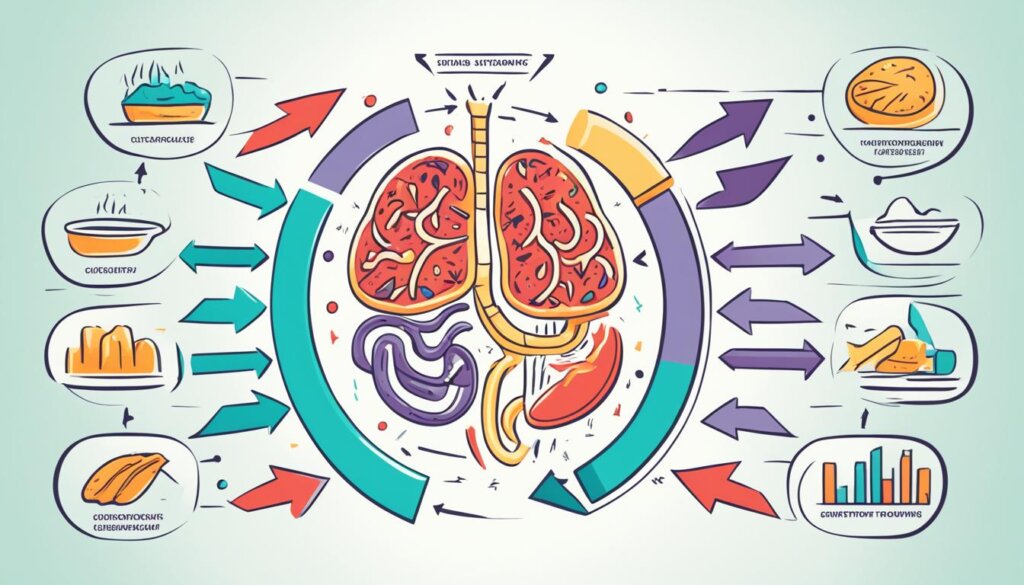
If you have ongoing or bad bloating, you should see a doctor. They can find out why and make a plan to help you feel better.
Lifestyle Remedies for Bloating Relief
Simple changes in your life can help with bloating. Making changes to your diet, staying active, and trying natural remedies can help. These steps can make you feel better overall.
Dietary and Exercise Tips
Changing what you eat is a key way to fight bloating. Eating less of foods that make gas can help. Only 7% of people get enough fiber, which is important for digestion. So, add more fiber slowly to avoid more bloating.
For those with irritable bowel syndrome (IBS), eating low-FODMAP foods helps. A study in 2020 found that this diet cut IBS symptoms by 45 percentage points. Drinking enough water also helps move food through your system, easing bloating.
Being active, like walking or doing gentle exercises, can also help. Exercise helps move gas through your better. This makes your digestion healthier and more efficient.
Natural remedies like peppermint, ginger, and fennel can also ease bloating. Peppermint relaxes your intestines, letting gas pass more easily. Ginger and fennel stop gas from building up.
By using these tips on diet, exercise, and natural remedies, you can fight bloating better.
“Lifestyle changes, such as adjusting your diet and staying active, can be powerful tools in the fight against bloating.”
Dietary Tips | Exercise Tips | Natural Remedies |
|---|---|---|
– Reduce gas-producing foods – Increase fiber intake gradually – Adopt a low-FODMAP diet for IBS – Stay hydrated by drinking water | – Engage in light walking or gentle exercises – Regular physical activity helps stimulate gas passage | – Peppermint relaxes intestinal muscles – Ginger and fennel have carminative properties – Probiotics can help balance gut flora |
Over-the-Counter Treatments for Bloating
If you’re dealing with bloating, over-the-counter (OTC) meds can help. These meds aim to fix issues like gas, constipation, or stomach acid problems.
For gas, Beano can break down gas-making carbs. Pepto-Bismol might stop too much bacteria and cut gas. Simethicone in Gas-X helps get rid of trapped gas. Activated charcoal tablets, like CharcoCaps, can lessen the smell of gas.
If constipation is part of your bloating, try laxatives like Milk of Magnesia or Dulcolax. But use them carefully and not for too long. Lactase enzymes in Lactaid or Dairy Ease can ease bloating from lactose intolerance.
Always follow the directions on OTC meds and talk to a doctor if things don’t get better. Drinking plenty of water, eating right, and exercising gently can also help prevent bloating.

Remember, while OTC meds can help now and then, if bloating is bad or doesn’t go away, you might need a doctor’s help to find out why.
OTC Treatment | Mechanism of Action | Dosage | Potential Side Effects |
|---|---|---|---|
Simethicone (Gas-X) | Helps break up gas bubbles | 40-125 mg 4 times daily, max 500 mg/day | Generally well-tolerated |
Lactase enzymes (Lactaid, Dairy Ease) | Helps digest lactose, reducing gas | Follow product instructions | Potential vomiting |
Activated charcoal (CharcoCaps) | Absorbs gas and reduces odor | Follow product instructions | Generally well-tolerated |
Laxatives (Milk of Magnesia, Dulcolax) | Stimulate bowel movements to relieve constipation | Follow product instructions, do not use long-term | Abdominal cramps, bloating, dehydration |
Pepto-Bismol | Reduces bacterial overgrowth and inhibits infection | 30 ml every 30-60 minutes, max 240 ml/day | Ringing or buzzing in the ears |
“Consult a healthcare provider if you experience severe or persistent bloating, as it may indicate an underlying condition that requires medical attention.”
By figuring out how your body reacts to foods and trying different OTC options, you can ease bloating and feel better.
When to See a Doctor for Bloating
Occasional bloating is normal, but sometimes you should see a doctor. If bloating comes with other worrying signs, it might mean a serious issue that needs attention.
Warning Signs and Severe Symptoms
Get medical help if you have bad stomach pain, a high fever, bloody stools, or your belly swells fast. These signs could mean a serious issue like a bowel blockage, appendicitis, or a burst organ. It’s important to get checked out right away.
If you’re losing weight without trying, don’t want to eat, or have ongoing constipation or diarrhea, see a doctor. Also, if your poop has blood or mucus, you should get checked out. These could be signs of a problem that needs a doctor’s help.
While simple changes in your life and over-the-counter remedies can help with mild bloating, seeing a doctor is a good idea for chronic or severe bloating or if it’s with other bad symptoms. Your doctor can figure out what’s causing it and help you feel better.
“Bloating is one of those symptoms that can indicate a more serious condition, so it’s important to pay attention to it and not dismiss it as just a minor annoyance.”
Bloating During Pregnancy
Many pregnant women feel bloated, especially in the later stages. This comes from hormonal shifts, fluid buildup, and a growing belly. About 49% of pregnant women feel bloated. This gets worse around week 29 of the third trimester.
Hormonal changes during pregnancy cause bloating. Progesterone slows down digestion, leading to bloating and gas. The growing uterus also puts pressure on the stomach, making you feel full or tight.
This bloating is usually not a worry, but it can be annoying. In 55% of cases, pregnant women got help for bowel issues. Luckily, there are ways to ease bloating during pregnancy:
- Increase fiber intake gradually to improve digestion
- Drink at least 8 glasses of water per day to stay hydrated
- Prioritize regular physical activity, such as prenatal yoga or brisk walks
- Avoid gas-inducing foods like beans, cabbage, and fried items
- Opt for smaller, more frequent meals throughout the day
- Consider taking over-the-counter supplements like probiotics or stool softeners, but consult with a healthcare provider first
Don’t take laxatives during pregnancy, as they can cause problems. Usually, changing your diet and lifestyle helps with bloating.
If bloating is severe or doesn’t go away, talk to your healthcare provider. They can find out why and suggest how to feel better. Getting help for bloating can make pregnancy more comfortable.
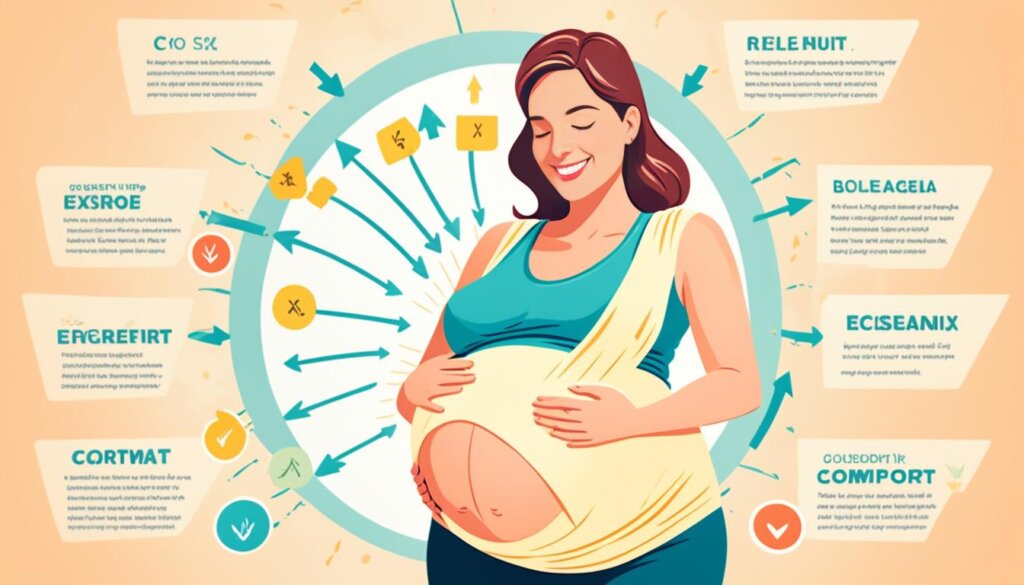
Preventing Bloating
It’s key to find and fix the main causes of bloating to stop or lessen it. This means changing your lifestyle and eating habits to cut down on gas and constipation.
Lifestyle Changes
One good way to stop bloating is to avoid actions that make you swallow a lot of air. Don’t eat or drink too fast, talk while eating, chew gum, or smoke. Also, staying active can help your digestive system work better. Light exercise can push gas out of your stomach and ease bloating.
Dietary Modifications
Changing what you eat can really help with bloating. Eating less of certain carbs that are hard to digest can help if you have irritable bowel syndrome or other digestive issues. Also, eating more fiber can help keep your bowel movements regular and stop constipation, which can cause bloating.
Find out which foods make you gassy and bloated. Foods like beans, peas, lentils, cabbage, onions, broccoli, cauliflower, whole-grain foods, mushrooms, some fruits, and fizzy drinks can be troublesome. Try eating bananas, oranges, cantaloupe, and fruits like blackberries and blueberries instead.
Even though some high-fiber foods like beans can cause bloating, it’s important to eat a balanced diet with enough fiber. By eating smart and avoiding foods that make you bloated, you can feel better.
If changing your life and diet doesn’t help, or if you have other bad symptoms like diarrhea, a lot of belly pain, or losing weight without trying, see a doctor. They can find out why you’re bloated and suggest the right treatment.
Conclusion
Abdominal bloating is a common issue that affects your health and well-being. Knowing the causes, like gas, digestive problems, hormonal shifts, and health conditions, helps you manage it.
Changing your lifestyle can help. This means eating better, exercising regularly, and finding out if you have food sensitivities. Over-the-counter meds and probiotics can also help ease your symptoms.
If bloating doesn’t go away or is very bad, see a doctor. They can find out why and help you with treatment. This might mean changing your diet, taking medicine, or dealing with health issues. Taking care of your gut health can prevent and manage bloating, making you feel better overall.
FAQ
What is bloating?
Bloating makes your belly feel full, tight, or swollen. You might feel a big belly, have discomfort, feel gassy, or have trouble with bowel movements.
What are the common causes of bloating?
Bloating often comes from gas in your stomach and intestines. It can also be from food intolerances, digestive problems like IBS or SIBO, and changes in hormones.
How can hormonal changes contribute to bloating?
Hormonal shifts, like during your period or menopause, can cause fluid retention and gas. This can make your belly swell and feel bloated.
What digestive disorders are linked to bloating?
Conditions like irritable bowel syndrome (IBS), inflammatory bowel diseases (IBD), and issues with digestion can cause bloating.
When should you see a doctor for bloating?
See a doctor if you have severe belly pain, fever, vomiting, bloody stools, or your belly swells fast. This could mean a serious issue.
How can you prevent or reduce episodes of bloating?
To stop or lessen bloating, find and fix the root cause. Avoid foods that make gas, drink plenty of water, exercise regularly, and try a low-FODMAP diet or fix constipation.
